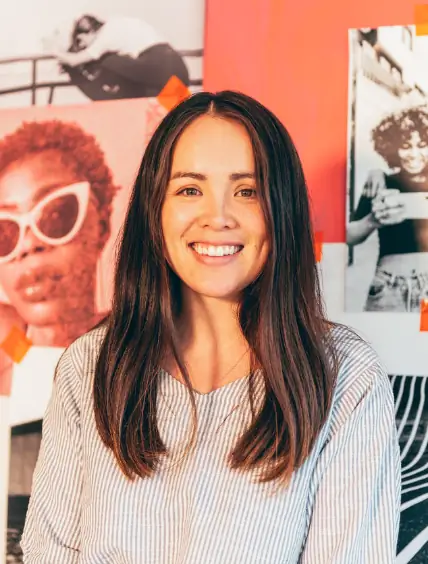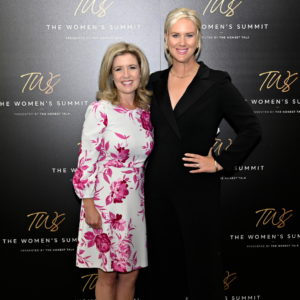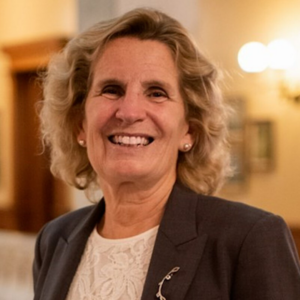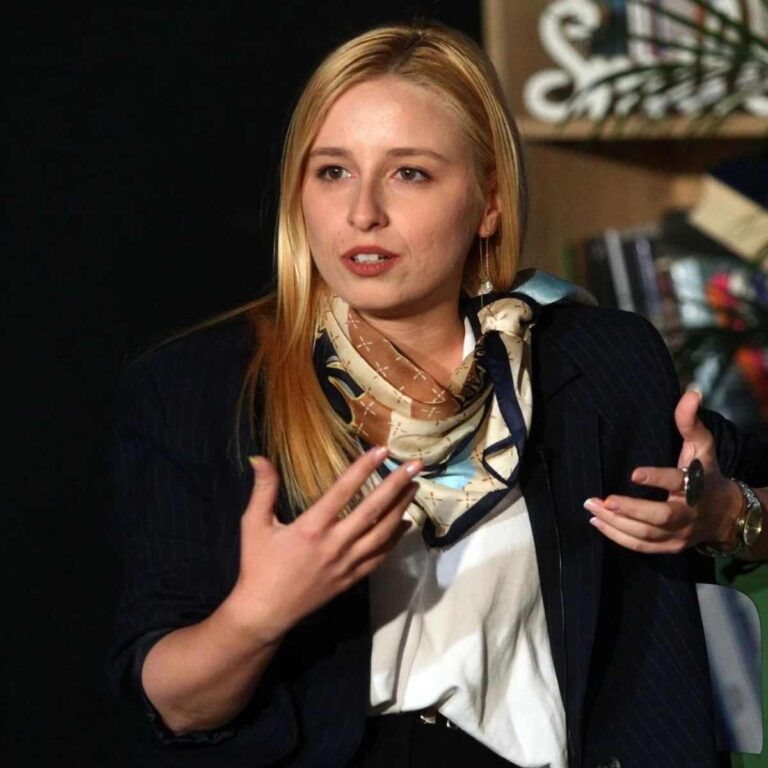Jacie deHoop – Entrepreneur and co-founder of The Gist, creating space for women in sport
A sports website for women-identifying fans? Now that is a home run! Just ask Jacie deHoop, co-founder of The GIST, a thriving sports media company and the go-to source for sports coverage and conversations for women. Launched across North America in 2019 by three college friends — Jacie deHoop, Ellen Hyslop, and Roslyn McLarty — The GIST is all about changing the game in the male-dominated sports industry, where fewer than 14% of journalists are women and less than 4% of coverage is on female athletes.
On this episode of The Honest Talk, Jacie joins Jennifer Stewart and Catherine Clark to talk about launching The GIST and creating content for women-identifying sports fans. She also breaks down the hard work, dedication, and enthusiasm that have grown The GIST from a weekly newsletter to a multi-platform powerhouse in just three years.
Note: This transcript has been edited for clarity and length.

Decision to start The GIST, sport media for women
Catherine Clark: Give us a sense of why you started The GIST.
Jacie deHoop: We launched The GIST in 2018 in Canada. 2018 was really when we quit our full-time jobs to pursue it full-time. And really the premise came from myself and my co-founders and our personal experiences. The three of us met while we were at Queen’s University. We were all in the Commerce program there, and we were great friends. After we graduated, we all moved to Toronto. We were all working in different areas in financial services. If you’re picturing Bay Street, it was very corporate, very male-dominated workplaces.
We grew up as athletes. We loved sports, played a ton of different sports at a competitive level and at a recreational level. And it was interesting, because I found when we switched to being in Toronto, and being in that really corporate environment, sports didn’t feel as much a part of our lives, and that was from a participation standpoint, and actually playing, but also from a sports fandom perspective.
In each of our workplaces we saw how sport is this amazing thing that brings people together like nothing else. But at the same time, when you’re a female-identifying fan, it’s really easy to feel on the outside of that sports conversation or on the outside of that sports community.
Unfortunately, it still can feel like this boys’ club or intimidating space. And that’s coming from myself and my co-founders, who again, grew up playing all these sports. So, we wanted the premise to be making sports content more accessible and more inclusive.
But accessibility also means free content. we didn’t want the audience or a female fan to be paying for the content and to have that kind of barrier. We were just working off the side of our desks and started sending out the newsletter every Monday morning. We started with a list of 500 people, which was essentially us signing up all of our friends, all of our workplaces. We had about six months where we were operating it as a side hustle. And then we got accepted to an incubator program that was being put on by the DMZ in Toronto. That’s kind of this startup incubator space. That was really that catalyst that gave us this space, and honestly the funding in many ways, to leave our jobs and pursue that just full time.
How to differentiate yourself from competitors
Jennifer Stewart: The sports world is so saturated with content, with newsletters, with websites, how do you actually differentiate your content so that it stands out amongst a whole sea of competitors for you?
Jacie deHoop: The sports world in general has ignored and treated the female fans as an afterthought. I think for all of us on this call who’ve watched TSN or Sports.net or really any more like traditional sports media, none of that content is created with you in mind, and oftentimes really geared towards a male fan, and just somebody who’s really in the sports world. And so we created The GIST for ourselves and saw that opportunity to better serve a different audience that maybe doesn’t look like or act like that kind of typical or traditional sports fan. The majority of our audience is female-identifying, but that also just means somebody who, again, just doesn’t look like that kind of avid fan. We have so many queer GISTers, too. We really focus on those more progressive storylines. There’s a lot of magic to sports, but there’s a lot of things that don’t get the coverage that they really should. I think how we differentiated ourselves has been focusing on who we think of as that underserved fan that’s really been that afterthought.
Catherine Clark: A lot of times what’s happened to women in the past who have big ideas to disrupt how things have traditionally been done, is that we’re either pushed to the side, or we’re patted on the head and told, “What a nice idea,’ and then nothing happens. But things really do seem to be changing. And you’re clearly an example of that. But what kind of response did you get when you first proposed the brand?
Jacie deHoop: We definitely had that in our early days. Whether it’s a focus on more diverse fans or underrepresented fans or women’s sports, this space has progressed incredibly over the last few years. Even in 2018, when we were pitching the concept of The GIST, whether that was to investors and these startup accelerators or to some of the big traditional sports media players, there was absolutely not the reception that we get today.
We got tons of feedback that there was really not a market for this, or it was just so so niche, which is really interesting, because 50% of the population is female. And we’ve seen that there’s just so much interest from women in sports, like in a myriad of ways, but certainly in the early days it was a total slog. I think now it’s very easy to assume that we’ve been on this upward trajectory, but we got a lot of feedback in the early days that was certainly very discouraging.
But we’ve also been really fortunate to be a co-founding team and the three of us are such close friends that I do think that really helped us get through it. I have so much admiration for solo founders, and particularly solo female founders, because we all lean on each other so, so much. And I think especially in those early days, when we were getting a lot of that pushback, it would have been incredibly difficult to persevere through that and see the bigger picture.
I have so much admiration for solo founders, and particularly solo female founders, because we all lean on each other so, so much.
Jennifer Stewart: Did you ever have a moment where you just wanted to give up?
Jacie deHoop: We have certainly had moments where it just felt like too much. And we still have those today, absolutely, with this broader recession that’s been happening. We track our metrics so closely. If you’re under target, it’s super discouraging. We’re a very small team. There’s so many challenges every day: we’re all new to this space, and we’re learning everything on the go. So there’s a lot of moments where it feels like it’s overwhelming. I don’t think we’ve had a moment, though, where we have been like, “We want to kind of give up on this.”
Again, I really think that comes down to having the three of us, all with a resolute vision of what The GIST can become. And if one of us is feeling really discouraged or just not in a good space about where we’re going, the other two are able to offset that. Being a founder, you have to be a bit delusional, and have that optimism, even when it feels like you’re really in the trenches.
The biggest learning experience
Catherine Clark: What has been the biggest learning experience for you personally since you started the company? Is there one thing that’s stood out that you didn’t know about yourself going into it?
Jacie deHoop: I think back to who I was, personally, just from a career standpoint, from a leadership standpoint, when we started The GIST, I do in many ways feel like a super different person. Starting a company and going through the challenges that come with that really forced you to grow personally. I think I have found in all three of us, and certainly in myself personally, a level of resilience that I didn’t have or wasn’t really exposed to in my earlier career.
We’re all relatively young leaders and managers as well. And our team has been growing really rapidly. We now have 18 full-time employees and about another 20 part-time. The opportunity to really lead a team and manage people has been huge. It has taught me a lot about myself. I’ve been fortunate to have that experience. We’ve kind of been thrown into it but have grown so much as a result, too.
How to use feedback to succeeded
Catherine Clark: What kind of advice do you have for other women who have an idea, but may not have grown it the way that you have? They may not have had the confidence to see it through this far, but it’s still there, it’s still in the back of their mind, they’re still thinking about it. What advice do you have for them?
Jacie deHoop: Being really open to feedback and getting as much feedback as you can is incredibly important. We came from the finance world, so sports media, even marketing and partnerships, was really out of our realm. So we leaned on and listened to as many experienced and smart people in those spaces as we could.
Be really open to feedback and getting as much feedback as you can is incredibly important.
At the same time, as I mentioned earlier, we didn’t always get positive feedback from a lot of those folks. And I think really knowing what your guiding values are and what your broader vision is and really listening and being open to as much feedback as you can. Sharing your idea with as many people as possible is so important, but also not getting too discouraged in some ways if you’re not getting the feedback that you’re looking for – taking that step back on some of the advice that you are receiving and really thinking intentionally about how you’re going to act on some of that feedback – I think that’s something that in the early days is really, really important.
The second thing is to lean on and make sure that you have that support network there. I mentioned the three of us as a co-founding team, we’re essentially married. We lean on each other so much. I think the support and friendship and respect and trust and love that the three of us have has been so foundational to any success that we’ve had. Whether it’s friends, family, or mentors, having those people around you and having that support and those people is so important. I think it’s really easy to be and feel lonely as a founder, and a lot of the things that you’re going through are very individual. Just making sure you have that support around you and you are really nurturing and cultivating that support network around you is so important.
And I think the last piece of advice that I would have is that it really is all about execution. Many founders have just amazing ideas. But if you can’t actually execute and complete each thing that’s needed, all those incremental steps to get to that big milestone, then you don’t have a business. I would definitely underscore the importance of diligence and work ethic and execution side of things as well.
It really is all about execution. Many founders have just amazing ideas. But if you can’t actually execute and complete each thing that’s needed, then you don’t have a business.
Impact of The GIST on her marriage
Jennifer Stewart: You mentioned you’re in a marriage with your founders, which I love. But you’re also recently married. How has The GIST impacted your real-life marriage?
Jacie deHoop: My partner Nick and I have been married for just about a year now. And we’ve been together for a very long time, since Queen’s University. Being a founder is really taxing on your personal life as well. My partner Nick is going through his residency. It’s also been really busy going through medical school, when we were getting The GIST going. So we’ve both been very career focused, which I think has been really helpful. Because we’re both heads down in what we’re working on. It is really taxing and takes up a lot of your time.
Having a partner that gets that and is really supportive of that has been super important for overall success.










